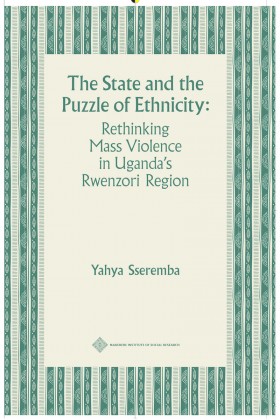Why does mass violence persist in Africa? Focusing on Uganda’s Rwenzori region where
thousands have perished in a century of recurrent fighting between one ethnic group and another
and between successive governments and the Bakonzo society, Yahya Sseremba examines how
remedies advanced to address violence end up reproducing the institutional logic that drives
violence. If the problem started in the early twentieth century when the ethnic groups that were
not allocated tribal homelands (Bakonzo and Bamba) questioned the British creation of the
hitherto multi-ethnic Toro as a tribal homeland for only one ethnic group (the Batoro), the post-
colonial Ugandan governments tried to end the conflict by creating new tribal homelands
(Kasese and Bundibugyo districts) for the marginalized ethnic groups. To solve the tensions
generated by a tribal homeland by creating more homelands is to entrench the divisive and
explosive logic that underlies the very project of tribal homelands. The governments of both Idi
Amin and Yoweri Museveni acknowledged the futility of creating new homelands to solve old
ethnic conflicts, but they could not explain—nor could they withstand—the massive popularity
of the demand for a tribal homeland. This book identifies the voices in society that dispute the
core assumptions of the homeland project so as to think outside of the homeland logic that
reproduces violence on the continent.
CONTENTS
Chapter One
10: Introduction
Why would people celebrate when a massacre befalls their neighbours?
On 27 November 2016, Ugandan security forces slaughtered more than one hundred members of
the Bakonzo ethnic group at the palace of the Rwenzururu kingdom in the Rwenzori area of
western Uganda. Welcoming the bloodbath, the spokesperson for the nearby Bwamba kingdom
blamed the Bakonzo for seeking to terrorise…
Chapter Two
28: Chiefs, Elders and Ethnicity in Pre-Colonial Bunyoro
Chapter Three
56: The Making and Remaking of “Native Tribes”
Chapter Four
76: Indigenous Intellectuals and the Struggle for a Tribal Homeland
Chapter Five
95: The Resilience of the Native Question and the Persistence of Mass Violence
Chapter Six
114: Museveni, Ethnic Homelands and Prospects for Detribalisation
Chapter Seven
145: Beyond Criminalisation
156: References
About the author
Yahya Sseremba is a research fellow at Makerere Institute of Social Research, Makerere
University.


